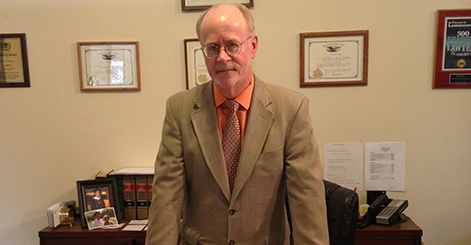Lawyer Limelight: Peter Hansen
By John Ryan | April 13, 2014 | Lawyer Limelights

Photo provided by the firm.
Peter Hansen graduated from the University of Iowa in 1979, with a major in philosophy, and three years later from the university’s College of Law. Since then, he has spent his entire professional life in the state and says he “would not trade my life here for any other place.”
Hansen, of Hansen Law Offices in Burlington, Iowa, handles a mix of civil and criminal litigation and was a past Lawdragon 500 member for his achievements. He also works as a contract attorney for two prisons, and early in his legal career he worked as a prosecuting attorney in the Lee County Attorney’s Office.
Lawdragon: With a general practice like yours, how do you go about selecting which clients to take on?
Peter Hansen: As far as selecting which clients to take on, even in my general practice, I never take on cases where I am unfamiliar with the type of legal issues presented. Over the last ten years, I have limited my general practice to handling criminal and civil litigation, and a fair amount of bankruptcy cases.
LD: How did you develop an interest in handling chapter 7 cases? What do you find satisfying about representing clients in this area?
PH: I developed an interest in handling Chapter 7 bankruptcy cases very early in my career. The idea of debt forgiveness goes back to antiquity. Under Mosaic law, the people of Israel were instructed to grant a release of debts every seven years. The basis of debt forgiveness has always been for men to extend generosity to those in our society who had fallen on hard times. God promised that he would bless the people who helped the less fortunate. I believe this same principle remains today. For me, I find it very satisfying to walk people through bankruptcy so they can find a fresh start.
LD: Also, can you shed some light on how the practice has changed over the years?
PH: When I began practicing law in the early 1980's, law offices still had manual typewriters and used carbon paper to make duplicates of their memos and pleadings. Lawyers would bring their horn books and manuals into the courtroom for reference. Today, of course, everything is stored on your smart phone or laptop. I also think there is something missing when we talk about the practice of law as a form of art. I honestly believe the best advocate is the one who finds his strength from an empathy with his client's hopelessness and weakness.
LD: I see that you have worked as a contract attorney for two prisons. What type of work do you do for them?
PH: I work as a contract attorney for one maximum security prison (Ft. Madison, Iowa) and one medium security prison (Mt. Pleasant, Iowa). The maximum security prison houses many inmates with life sentences. Most of the work for these men involves assistance with challenges to their sentences, such as post-conviction relief/habeas corpus, and challenges to the conditions of their confinement, such as excessive lock-up cases and prison brutality situations.
The medium security prison houses men with shorter sentences – usually two to five years of actual confinement. In the Mt. Pleasant facility, quite a few of the inmates are sex offenders. I could write volumes about these prisoners, but suffice it to say they are usually the least-liked in our society. Most of them, when their prison sentences are done, are required to register as a sex offender for life, and many of them are subjected to life-time parole requirements.
LD: Many attorneys over the years have cited the benefits of having worked as a prosecutor. What was your experience like in the Lee County Attorney’s Office?
PH: The best experience I gained as a prosecutor was the hands-on training it gave me in the courtroom. I am a great believer in our advocacy system as it has evolved, along with the right to trial by jury. Working as a prosecutor allowed me to see ordinary citizens work together to achieve fairness and justice in the courtroom.
LD: You did both your undergrad and law school at the University of Iowa. Have you always been in Iowa?
PH: After finishing law school at the University of Iowa, I have spent all of my time practicing here. I would not trade my life here for any other place. It is still full of fond memories of caring and devoted people.
LD: Is there anything else you can share about what influenced you in your decision to pursue a career in the law, or what has shaped you as an attorney?
PH: The single greatest influence on me personally, and on my career as an attorney, has been all of those times of solitude – between the mountains and the valleys – when I have had fellowship with my Lord. Those quiet times of rest and prayer have shaped me as a person and as an advocate. As the psalmist said:
“I will bless the Lord who has given me counsel; My heart also instructs me in the night seasons. I have set the Lord always before me; Because He is at my right hand I shall not be moved.” Psalm 16:7-8.
LD: What do you do when you want to get away from the office and leave work behind for a while?
PH: The best place for me to be when I need to get away from work is to go to my favorite spot in a quiet park, under the shade tree, and commune with God. Having quiet fellowship with Him is my place of rest.

